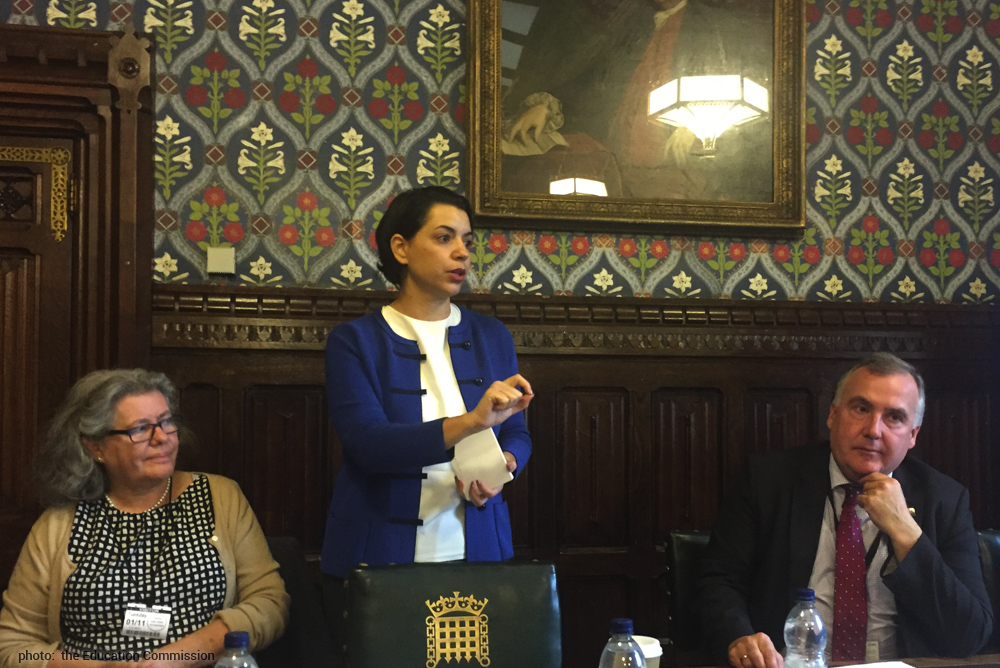Yesterday, the International Commission on Financing Global Education Opportunity’s (Education Commission) report, “The Learning Generation: Investing in education for a changing world,” was received by a UK Parliamentary Panel. Lord Bates, the Minister of State for International Development, welcomed the Commission’s report saying “We will be a partner of the Education Commission.”
This presentation was part of the “Creating a learning generation: The UK’s crucial role in financing quality education for all” event organized by the Global Campaign for Education UK (GCE-UK) and the All-Party Parliamentary Group (APPG) on Global Education for All Secretariat. The event received additional support from Plan International UK, Save the Children, Results UK, ADD, Leonard Cheshire Disability, Handicap International, IRC, NUT and War Child, several of whom contributed research to the Education Commission report.
The Commission’s report was presented by Commissioner Dr. Amel Karboul, the Secretary-General of MEF (Maghreb Economic Forum) and the Former Minister of Tourism of Tunisia. Dr. Karboul discussed the report’s recommendations, first presented to United Nation’s Secretary-General Ban Ki-moon at the start of the 2016 General Assembly. As raised by Dr. Karboul, the Commission report calls for the largest expansion of educational opportunity in modern history necessary to ensure the fulfillment of the fourth Sustainable Development Goal and achieve what the Commission calls a “Learning Generation” defined by universal primary and secondary learning. Achieving this requires more resources be directed toward education, as well as the improved use of existing resources.
To avoid a lost generation defined by 825 million children in low and middle-income countries – half of the world’s 1.6 billion children – unable to secure basic secondary-level skills by 2030, the Commission articulates four transformations that world leaders can adopt today to ensure an expansion of educational opportunity. By strengthening performance, fostering innovation, prioritizing inclusion and increasing finance, the Commission believes a “learning generation” can be achieved. The Commission’s financing recommendations were brought into focus at the Parliamentary event, specifically the “Financing Compact for the Learning Generation” and the Multilateral Development Bank (MDB) Investment Mechanism seeking to mobilize an additional $20 billion annually from international institutions by 2030.
These recommendations, and others, were well-received by the keynote speakers at the Parliamentary Panel. These individuals included Mark Williams, Member of Parliament; Lord Bates, Minister of State for International Development; Alice Albright, CEO of the Global Partnership for Education; Pauline Rose, Director of the Research and Equitable Access and Learning (REAL) Centre at the University of Cambridge; and Tanya Barron, CEO of Plan International UK and Representative of the Global Campaign for Education – UK Policy Group.
Lord Bates signaled support for the Education Commission report saying: “We will be a partner of the Education Commission. We are with you in what you are doing.”
Alice Albright said: “We are just delighted with the report. It really presents a fresh and urgent case for why we need to invest in education. But it also goes beyond that and shows how – through the four transformations.” She concluded that it is a “landmark piece of work.”
Professor Pauline Rose delivered a presentation on equitable domestic financing and the Commission’s call for a progressive universalist approach to educational reform. Professor Rose contributed research to the Commission report and has been closely involved in its production. She said: “The message of the Education Commission is that we need to invest early and find innovative ways of financing higher levels of investment is vital. At the moment, the rich are not paying sufficient taxes and the rich are benefitting disproportionately from public spending.”
Professor Rose added: “What is really important is seeing evidence as the basis for what we are doing. That is why the Education Commission’s report is so important – it brings together evidence-based arguments.”
Tanya Barron concluded: “The Education Commission’s report is groundbreaking. It is a fantastic report that everyone should have in their back pockets.”


This is a very welcome development by the British Government; we seek to mobilise many more champions who will back the Recommendations of the Learning Generation with critical actions – it is a document that resonates with most contexts and its application is universally relevant..across the 4 transformations – it makes a compelling case for urgency of financing at domestic and international levels for performance, innovations and inclusion to reach ALL and especially teh most vulnerable groups